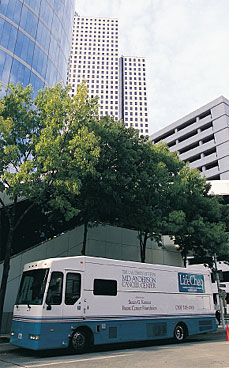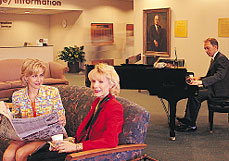
| On a tour stop, Tee Couch
talks to a group in the John P. McGovern, M.D. Visitors Gallery. |
|
 ancer
ranks among the nation’s leading health concerns. So it’s
understandable that people want timely and relevant information on
how to access optimal treatments and, whenever possible, what steps
to take to prevent cancer. ancer
ranks among the nation’s leading health concerns. So it’s
understandable that people want timely and relevant information on
how to access optimal treatments and, whenever possible, what steps
to take to prevent cancer.
 The
Public Education Office provides many programs to help raise cancer
awareness. These include a regional Office of the National Cancer
Institute’s Cancer Information Service (1-800-4-CANCER), which
has reached almost 450,000 callers since it opened in 1976. The
Public Education Office provides many programs to help raise cancer
awareness. These include a regional Office of the National Cancer
Institute’s Cancer Information Service (1-800-4-CANCER), which
has reached almost 450,000 callers since it opened in 1976.
 During
the past fiscal year, 3,578 individuals took part in 335 institutional
tours, which gave them opportunities to visit research laboratories
and see patient care services in action. More than 42,000 individuals
learned about cancer through health fairs, exhibits and special
presentations to worksites, school groups and civic organizations. During
the past fiscal year, 3,578 individuals took part in 335 institutional
tours, which gave them opportunities to visit research laboratories
and see patient care services in action. More than 42,000 individuals
learned about cancer through health fairs, exhibits and special
presentations to worksites, school groups and civic organizations.
 In
addition, the Public Education Office initiates and supports education
efforts with other organizations and conducts community outreach
programs focused on prevention and early detection of cancer. In
addition, the Public Education Office initiates and supports education
efforts with other organizations and conducts community outreach
programs focused on prevention and early detection of cancer.
 The
development of a breast cancer survivorship program model in partnership
with the Sisters Network, Inc., is a meaningful example. Completed
in 1997, the curriculum — based upon the organization of the
Sisters Network, Inc. — was distributed across the nation to
groups wanting to form a similar organization in their city. The
development of a breast cancer survivorship program model in partnership
with the Sisters Network, Inc., is a meaningful example. Completed
in 1997, the curriculum — based upon the organization of the
Sisters Network, Inc. — was distributed across the nation to
groups wanting to form a similar organization in their city.
|





